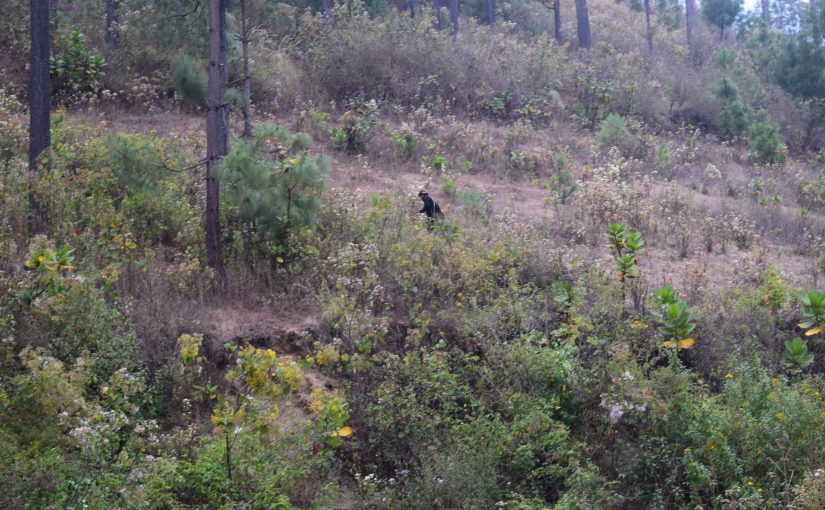In this lesson we will learn reflexive and reciprocal constructions, as well as some nominal phrases that utilize them.
Nacho and Xwan talk about meeting up to play soccer after class.
Xwan: Xok aq’ab’ a Nacho.
Nacho: Xok aq’ab a Xwan.
Xwan: La utz awach?
Nacho: Je’, utz, e k’u ri at? La utz awach?
Xwan: Utz, maltyox. Jas kab’an chwe’q?
Nacho: Chwe’q? Kimb’e pa etz’anem.
Xwan: Jachike ramaj katb’ek?
Nacho: Pa taq a las 4. La kawaj katb’e wuk’?
Xwan: Je’, utz, kintijob’ej wib’ chech le etz’anem chirij potz.
Nacho: Utz, choq utz we xaq si kapatz’ b’i awib’ chirij le tijonik.
Xwan: Utz la’. Jawi’ kaqil wi qib’?
Nacho: We ne utz we pa le uxlanb’al.
Xwan: Utz la’. Chajij awib’!
Nacho: Xaq junam. Chwe’q chik.
Xwan: Chwe’q chik. Jeb’a’!
Nacho: Jeb’a’!
Xwan: Good evening Nacho.
Nacho: Good evening, Xwan.
Xwan: How are you?
Nacho: I’m good, and you, how are you?
Xwan: Good, thanks. What are you doing tomorrow?
Nacho: Tomorrow? I’m going to play (soccer).
Xwan: What time are you going?
Nacho: At 4. Do you want to come with me?
Xwan: Yes, I do. I can practice playing soccer.
Nacho: Good, you can change after class.
Xwan: Alright. Where do we see each other? (Where sould we meet?)
Nacho: Maybe at the park.
Xwan: Ok, take care!
Nacho: You too, see you tomorrow!
Xwan: See you tomorrow. Good bye!
Nacho: Good bye!
In reflexives constructions, the subject and object of transitive verbs are the same. In K’iche’ they are formed with the relational noun –ib’ “self” following the verb. With some exceptions, -ib’ agrees in person and number with the verbal subject, as in English.
Reflexives constructions require a transitive verb, which may be a completive passive. In honorific address, the pronouns la/alaq are used once, after the reflexive noun (see the example below).
| myself | ourselves | ||
| yourself (informal) | y’all’s selves (informal) | ||
| yourself (formal) | y’all’s selves (formal) | ||
| her/his/its self | themselves |
An example of an incompletive reflexive verb:
I study.
You study.
He/she studies.
You (formal, sg) study.
We study
You all study.
They study.
You all (formal) study.
In the plural, reflexive constructions can have a reciprocal meaning “with each other”
We will meet each other tomorrow.
A colloquial way to say good-bye:
We will see each other! See you later!
The reflexive marker –ib’ occurs also in nouns. It does not take possessive markers if it is not possessed.
Mirror.
I bought a mirror for myself.
The difference.
What is the difference between this one and the other one?
The meeting.
There is a meeting.
We have a meeting tomorrow.
Hide-and-seek (name of the game).
The children play hide-and-seek.
A scare.
Halloween is a big scare.
Something that you use to make a living; that which feeds us, puts food on the table.
My work is what puts food on the table.
| chajij | to guard; to take care of |
| chajij -ib’ | to be careful; to take care of one’s self |
| ch’ab’ej | to talk with somebody |
| ch’ab’ej -ib’ | to talk with each other |
| xe’j ib’//xib’ij | to be frightened, scared; to frighten |
| kamsaj | to kill |
| riq(o) | to find |
| riq -ib’ | to meet up |
| esaj/elesaj | to take out; to remove |
| esaj ib’ | to remove one’s self (from); to quit something |
| tijoj | to teach |
| tijoj -ib’ (che) | to study; to teach one’s self |
| ch’aj | to wash/to bathe/shower |
| ch’ajoj -ib’ | to wash one’s self |
| b’an ub’anik -ib’ | to prepare |
| tas -ib’ | to become independent, to isolate oneself |
Translate the following phrases into English:
- Kaqatijoj qib’ che le chak.
- Kachajij ib’ alaq.
- Xinxe’j wib’.
- La xich’ab’ej iwib’ iwir?
- Kariq ib’ alaq pa k’ayb’al.
- Kaqachajij qib’ pa b’e.
- Karesaj rib’ pa le chak.
- Kich’ab’ej iwib’ ruk’ le nunan.
Answers
- .We get trained for the job.
- Take care of yourselves (formal, plural).
- I got scared.
- Did you all talk to each other yesterday?
- You all meet each other at the market.
- We take care of each other on the way.
- He/she resigned from his/her job.
- You all talk to my mother.
Translate the following phrases into K’iche’
- I am going to become independent from my parents.
- They were killing each other when I arrived.
- Did you meet each other this morning?
- We are studying for the class.
- Did you (formal, pl) frighten yourselves?
- We are taking care of each other.
- Tomorrow we are talking again.
- Did you wash yourself?
- Did you prepare yourself for the meeting?
- I am seeing myself.
Answers
- Kintas wib’ chkij le nutat nunan.
- Tajin kakikamsaj kib’ aretaq xinopanik.
- La xiriq iwib’ nimaq’ab’.
- Kaqatijoj qib’ che le tijonik.
- La xe’j ib’ alaq?
- Kaqachajij qib’.
- Kaqach’ab’ej qib’ chwe’q.
- La xach’aj awib’?
- La xab’an ub’anik awib’ che le chomal?
- Kinwil wib’.
